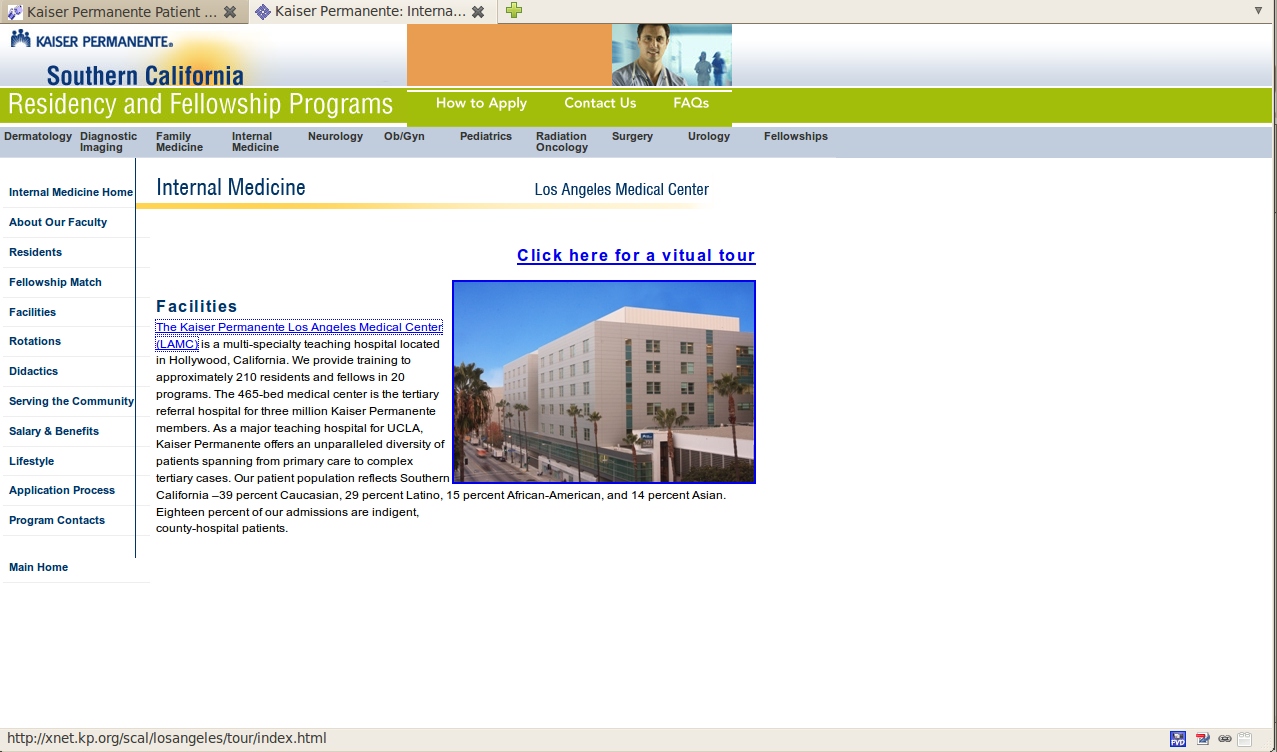
In Copyright Since September 11, 2000. This web site isn't affiliated with, and doesn't represent, any Kaiser entity, including but not limited to Permanente. This is instead a public interest nominative use site. Permission is granted to mirror this web site under Creative Commons CC BY-NC-SA 4.0. Please acknowledge where material was obtained.
Lawsuit - Vicki Lopez-Lunn was never informed of the increased risks associated with having resident surgeon,Emily Julia Bubbers, M.D.(current license # PG158864) perform a colonoscopy closure.
Viki Lopez-Lunn vs Kaiser Courthouse News write up here
Lawsuit - Kaiser physician patient vs Kaiser - Filed - July 2, 2012 - Kaiser research during surgery against the wishes of the patient who just happened to be another KP doctor. Joanne M. Loritz, M.D. vs Kaiser - et al and Garwood Gee M.D. write up here
Kaiser to launch training of family practice doctors by Guy Kovner of the Press Democrat
Selected Articles on the Patient Hand-off Compiled by Ingrid Philibert, Updated December2007 To describe the characteristics of and factors contributing to trainee errors, the authors analyzed malpractice claims in which trainees were judged to have played an important role in harmful errors.
Protecting Residency Programs’ ACGME Compliance Documents from Disclosure Under State Public Records Acts
Financial Gain from the GME Program
Funding for the GME Program - Where does the money come from?
Accreditation Council for Graduate Medical Education Data Resource Book Kaiser Permanente is a chain of Multidisciplinary Teaching Hospitals - All Kaiser Hospitals are Teaching Hospitals
Kaiser is a consortium of three separate but interdependent groups: the Kaiser Foundation Health Plan and Kaiser Foundation Hospitals are integrated with independent physician group practices called Permanente Medical Groups. The health plan is the insurance component of the organisation, while the hospitals and medical groups provide all clinical services. To the public these hospitals and general practitioner type facilities are seen as one organisation, commonly referred to as Kaiser.
See: https://kaiserpapers.com/pdfs/Strandberg-LarsenSchiotzandFrolich-1.pdf and in html at: https://kaiserpapers.com/Strandberg-LarsenSchiotzandFrolich.html
The advancement of medicine and improvement of physician skills is a good thing if the patientis informed, if the patient knowingly grants permission to be experimented and practiced on based on complete information and all persons and corporate interests involved are in agreement just how far these medical practices will be allowed to go with each patient and in each patient group. It is bad if the patient is not completely informed, is lied to, is selected as an experiment without their knowledge and if operations are performed solely for the purpose of a physician to gain board certification.
E. Professional Liability Insurance Kaiser Foundation Health Plan, Inc. (KFHP) provides professional liability protection for its employees and residents and the employees of the following organizations: Kaiser Foundation Hospitals, Kaiser Foundation Health Plan, Inc. and The Permanente Medical Group, Inc. if any such employee is named as a defendant in a law suit alleging negligence arising from work performed on behalf of these organizations. It is, therefore, unnecessary for a resident to carry professional liability insurance.
KFHP will provide a defense for each employee and will pay, when appropriate or legally obligated, all sums which may be required in judgment or settlement of damages or injuries sustained by an injured third party, provided the employee was acting in good faith and within the course and scope of his/her job responsibilities when the negligent act is alleged to have taken place. KFHP is not obligated to provide a defense for or indemnify the employee if he/she is deemed to have acted wrongfully outside the scope of his or her employment, for example, in committing a crime or deliberate act which is intended to harm another person or damage property.
KFHP's protection of the above mentioned employees is financially secured through a combination of self insurance reserves which are actuarially determined and recorded as liabilities on KFHP's balance sheet, and excess professional liability insurance policies which are underwritten by credit worthy commercial insurers and reinsurers.
Professional Liability Insurance covers residents while they are on residency duties in Kaiser Foundation Hospitals or a designated training site in California. This coverage does not include professional work outside of the residency program or volunteer activities without prior written approval of the Director of Graduate Medical Education. Any employee is free to obtain professional liability insurance if desired, but the cost of such independently purchased must be borne by the employee. See: https://kaiserpapers.com/pdfs/residency-training-manual-kaiser.pdf and online at: http://tinyurl.com/7dk7s2r
The following from the above document located on Page 1 under the RESIDENT ELIGIBILITY AND SELECTION Applicants must fulfill either the Accreditation Council for Graduate Medical Education (ACGME) qualifications for appointment to ACGME-accredited programs or the Council for Podiatric Medical Education (CPME) qualifications for appointment to CPME-accredited programs. All our ACGMEapproved residency programs participate in the National Residency Matching Program (NRMP).
The above means that these residents are from all over the world. "The National Resident Matching Program (NRMP) is a private, not-for-profit corporation established in 1952 to provide a uniform date of appointment to positions in graduate medical education (GME) in the United States." http://www.nrmp.org/ Index Below videos and Kaiser Permanente (LAMC) Teaching Hospital Information
And Now - This is a Kaiser Video on the GME Program
Kaiser Permanente Los Angeles (LAMC) - A
Teaching Hospital - Who is doing the Thriving?

"....a whole new industry utilising "human material" was about to emerge that would shape researchers' behaviour for decades to come." Please Read:
A July Spike in Fatal Medication Errors: A Possible Effect of New Medical Residents David P. Phillips, PhD and Gwendolyn E. C. Barker, BA Department of Sociology, University of California at San Diego, La Jolla, CA, USA; School of Public Health, University of California at Los Angeles, Los Angeles, CA, USA.
CONCLUSIONS: We found a significant July spike in fatal medication errors insidemedical institutions. After assessing competing explanations, we concluded that the July mortality spike results at least partly from changes associated with the arrival of new medical residents. Accepted March 24, 2010 Published online May 29, 2010 For historical purposes may also be downloaded here: https://kaiserpapers.com/gme/pdfs/spike-in-medi-errors-july.pdf
SUGGESTION from KPRC - If you cannot go to another hospital, be prepared to ask more questions. Kaiser Permanente is a group of teaching hospitals.
...teaching physicians purportedly supervised the work of medical residents or students. T he patients' records failed to show that the instructors were present, authorities said. - SF Chronicle - Bob Egelko writer http://tinyurl.com/yc6snp3 mirrored at: https://kaiserpapers.com/gme/no-doctor.html
Read more: http://www.sfgate.com/cgi-bin/article.cgi?f=/ c/a/2009/12/04/BA4T1AUL8B.DTL#ixzz0YlXTWNYS
October 27, 2009 Thomas J. Nasca, M.D., MACP CEO, Accreditation Council for Graduate Medical Education open letter
Patient Safety or non Safety
Some known cases Using federal grant dollars for unjust enrichment, personal gain, or other than their intended use is a form of theft, subject to criminal and civil prosecution under the laws of the United States.
Federal grant dollars are susceptible to several forms of financial theft, most commonly in the form of specific federal violations, including: 1. Embezzlement 2. Theft or Bribery concerning programs receiving Federal funds 3. False Statements 4. False Claims 5. Mail Fraud and Wire Fraud
Each of these violations of law are subject to criminal prosecution, fines, restitution, and civil penalties.
When business entities, individuals, communities, and other organizations receive federal grant dollars, they are entrusted with their appropriate expenditure.
Grant fraud is most often committed by: 1. Grant recipients, company officers, business partners, board members, and managers. 2. Bookkeepers, financial staff, and employees. 3. Contractors and subcontractors engaged with the recipient. 4. Recipient consultants.
Common Grant Fraud Scenarios Grant fraud occurs in many ways, but some of the most common fraud scenarios include:
1. Charging personal expenses as business expenses against the grant.
2. Charging for costs which have not been incurred or are not attributable to the grant.
3. Charging for inflated labor costs or hours, or categories of labor which have not been incurred (for example, fictitious employees, contractors, or consultants).
Review the entire document at: https://kaiserpapers.com/gme/pdfs/GrantFraud.pdf
"There is an evolving, very strong concern progressing to alarm among some, that our undergirding principle of graded authority and progressive responsibility coupled with graded and diminishing (but appropriate) supervision is eroding in the contemporary American teaching hospital. While appearing to occur contemporaneously with resident duty hour limits, this erosion appears to have had its roots in the latter portion of the previous decade. An unintended consequence of the I.L. 372 interpretations leading to the PATH Audits of the late 1990’s was the beginning of a significant erosion of the delegation of authority for patient care of residents and fellows.
The medical liability insurance crisis of earlier this decade, and the associated “risk management” policies and procedures put in place in most institutions have had a chilling effect on the delegation of authority and responsibility, especially to senior residents, for complex decision making and performance of procedures.
The pressures placed on productivity and revenue generation by academic clinical faculty, coupled with the compliance motivated performance and documentation of key aspects of patient care in order to bill for services has removed the resident from the central role in provision of patient care in many teaching settings. Finally, the enactment of resident duty hour standards, as appropriate and well meaning as intended, have had in some settings the unintended consequence of removal of the resident from the previously held “pivotal role” in the care of patients on the teaching service.
It is the “concern evolving to alarm” that we may have crossed a critical point, resulting in inadequate meaningful patient responsibility in a critical mass of the residents’ experience. This, it is feared, will lead to inadequately trained clinicians entering the unsupervised practice of medicine. "
Written: October 27, 2009 Thomas J. Nasca, M.D., MACP CEO, Accreditation Council for Graduate Medical Education Vice Chair, Task Force for the Revision of ACGME Resident Duty Hour Standards entire letter available at: http://acgme.org/acWebsite/home/home.asp http://acgme.org/acWebsite/home/NascaLetterCommunity10_27_09.pdf mirrored for historical purposes at: https://kaiserpapers.com/gme/pdfs/NascaLetterCommunity10_27_09-1.pdf